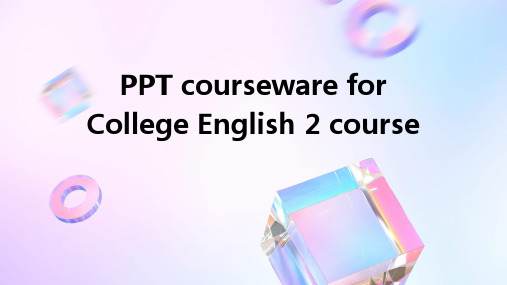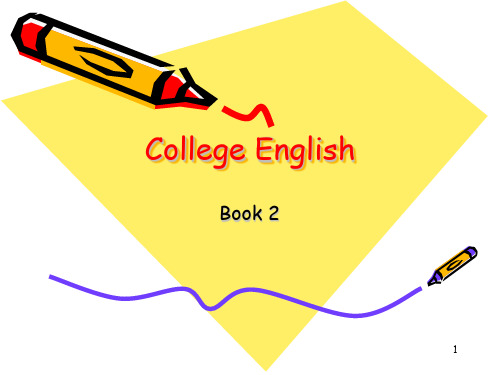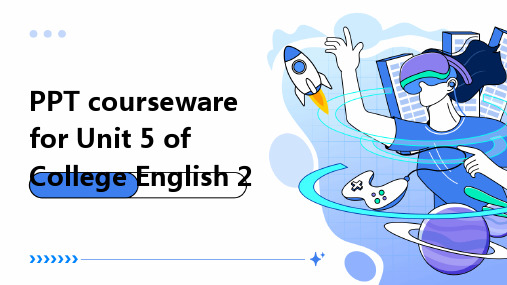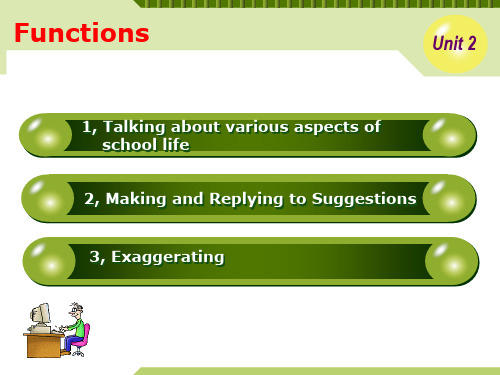大学英语第二册精品PPT课件
合集下载
大学英语2课ppt课件ppt课件

Assignments
Students will complete regular assignments to practice and apply the knowledge gained in class.
Tutorials
Tutorials will provide students with additional support and help in areas where they may need extra assistance.
05
Course Summary and Outlook
Review of learning outcomes
01 02 03 04
回顾学习成果
掌握3000个以上英语单词,能够进行日常交流和简单的学术讨论。
掌握英语语法和句型,能够写出结构完整的段落和短文。 提高英语听说能力,能够听懂英语新闻、电影、演讲等,并能够进行
02
Basic English knowledge
Vocabulary learning
掌握基础词汇
PPT课件中应包含大量的基础词汇,并配有生动的图片和例句,帮助学生理解和 记忆。
Grammar comprehension
提高语法理解
通过PPT课件的讲解和练习,使学生能够掌握英语的基本语法结构,培养他们的语言组织能力。
course arrangement
Lectures
Weekly lectures will cover the course content, including theoretical concepts and practical applications.
Exams
There will be two exams throughout the semester, one midterm and one final exam, to assess students' understanding and retention of course material.
全新版大学英语综合教程第二册完整(完整版)ppt课件

.
3
Part II Text A
Howard Gardner, a professor of education at Harvard University, reflects on a visit to China and gives his thoughts on different approaches to learning in China and the West.
LEARNING, CHINESE-STYLE Howard Gardner For a month in the spring of 1987, my wife Ellen and I lived in the bustling eastern Chinese city of Nanjing with our 18-month-old son Benjamin while studying arts education in Chinese kindergartens and elementary schools. But one of the most telling lessons Ellen and I got in the difference between Chinese and American ideas of education came not in the classroom but in the lobby of the Jinling Hotel where we stayed in Nanjing. The key to our room was attached to a large plastic block with the room number on it. When leaving the hotel, a guest was encouraged to turn in the key, either by handing it to an attendant or by dropping it through a slot into a box. Because the key slot was narrow, the key had to be positioned carefully to fit into it.
全新版大学英语综合教程第二册ppt课件

*
Benjamin loved to carry the key around, shaking it vigorously. He also liked to try to place it into the slot. Because of his tender age and incomplete understanding of the need to position the key just so, he would usually fail. Benjamin was not bothered in the least. He probably got as much pleasure out of the sounds the key made as he did those few times when the key actually found its way into the slot. Now both Ellen and I were perfectly happy to allow Benjamin to bang the key near the key slot. His exploratory behavior seemed harmless enough. But I soon observed an interesting phenomenon. Any Chinese staff member nearby would come over to watch Benjamin and, noting his lack of initial success, attempt to assist. He or she would hold onto Benjamin's hand and, gently but firmly, guide it directly toward the slot, reposition it as necessary, and help him to insert it. The "teacher" would then smile somewhat expectantly at Ellen or me, as if awaiting a thank you — and on occasion would frown slightly, as if considering us to be neglecting our parental duties. I soon realized that this incident was directly relevant to our assigned tasks in China: to investigate the ways of early childhood education (especially in the arts), and to throw light on Chinese attitudes toward creativity. And so before long I began to introduce the key-slot anecdote into my discussions with Chinesoward Gardner, a professor of education at Harvard University, reflects on a visit to China and gives his thoughts on different approaches to learning in China and the West. LEARNING, CHINESE-STYLE Howard Gardner For a month in the spring of 1987, my wife Ellen and I lived in the bustling eastern Chinese city of Nanjing with our 18-month-old son Benjamin while studying arts education in Chinese kindergartens and elementary schools. But one of the most telling lessons Ellen and I got in the difference between Chinese and American ideas of education came not in the classroom but in the lobby of the Jinling Hotel where we stayed in Nanjing. The key to our room was attached to a large plastic block with the room number on it. When leaving the hotel, a guest was encouraged to turn in the key, either by handing it to an attendant or by dropping it through a slot into a box. Because the key slot was narrow, the key had to be positioned carefully to fit into it.
Benjamin loved to carry the key around, shaking it vigorously. He also liked to try to place it into the slot. Because of his tender age and incomplete understanding of the need to position the key just so, he would usually fail. Benjamin was not bothered in the least. He probably got as much pleasure out of the sounds the key made as he did those few times when the key actually found its way into the slot. Now both Ellen and I were perfectly happy to allow Benjamin to bang the key near the key slot. His exploratory behavior seemed harmless enough. But I soon observed an interesting phenomenon. Any Chinese staff member nearby would come over to watch Benjamin and, noting his lack of initial success, attempt to assist. He or she would hold onto Benjamin's hand and, gently but firmly, guide it directly toward the slot, reposition it as necessary, and help him to insert it. The "teacher" would then smile somewhat expectantly at Ellen or me, as if awaiting a thank you — and on occasion would frown slightly, as if considering us to be neglecting our parental duties. I soon realized that this incident was directly relevant to our assigned tasks in China: to investigate the ways of early childhood education (especially in the arts), and to throw light on Chinese attitudes toward creativity. And so before long I began to introduce the key-slot anecdote into my discussions with Chinesoward Gardner, a professor of education at Harvard University, reflects on a visit to China and gives his thoughts on different approaches to learning in China and the West. LEARNING, CHINESE-STYLE Howard Gardner For a month in the spring of 1987, my wife Ellen and I lived in the bustling eastern Chinese city of Nanjing with our 18-month-old son Benjamin while studying arts education in Chinese kindergartens and elementary schools. But one of the most telling lessons Ellen and I got in the difference between Chinese and American ideas of education came not in the classroom but in the lobby of the Jinling Hotel where we stayed in Nanjing. The key to our room was attached to a large plastic block with the room number on it. When leaving the hotel, a guest was encouraged to turn in the key, either by handing it to an attendant or by dropping it through a slot into a box. Because the key slot was narrow, the key had to be positioned carefully to fit into it.
大学英语2 unit 2 PPT

Text Analysis
• Try to define the word “riches”. • Search for evidence/details showing why the author
is not “rich” and why he is “rich”. • The importance of evidence/details to convince the
• Part One (Paras. 1-2) • The writer’s encounter with a boy who raised the
question “Are you poor?”. • Part Two (Paras. 3-12) • In search of an answer the writer finds that not having
usefulexpressions?面临遭遇?仰头向上看?填写?属于?仅仅不多于不强于?转瞬即逝的念头?磨损损耗?富裕的有钱的?不自在格格不入?陈旧的家具beconfrontedwithlookupatfilloutfallintonothingmorethanapassingwhimwearandtearwelloffoutofplacedatedfurniture?之后不久?走下坡路失败?转折点?与
We burned with curiosity over what was in the box.)
• Collocation:
• from/out of curiosity
在好奇心驱使下
• in open curiosity
公然出头过问与自己无关的事
• Curiosity killed the cat. 好奇伤身。
大学英语精读第二册-Unit-2lessons-from-JeffersonPPT课件

During his presidency, Bill Clinton seized important opportunities on issues from welfare to free trade.
• (His staffers were known to say, "If Clinton were the Titanic, the iceberg would sink." )
statesman the first President of the United States
(On April 30, 1789, George Washington, took his oath of office as the first President of the United States. He pursued two interests: military arts and western expansion. )
He campaigned on a theme of change, inspiring millions of people both at home and abroad.
"change has come to America" 8
A Brief Introduction to Thomas Jefferson
appoint: vt. 1) choose (someone) for a position, job, etc. 任命,委任
2) to arrange, fix 约定,指定
Eg: Who will be appointed to the chairmanship when Mr. White leaves?
• (His staffers were known to say, "If Clinton were the Titanic, the iceberg would sink." )
statesman the first President of the United States
(On April 30, 1789, George Washington, took his oath of office as the first President of the United States. He pursued two interests: military arts and western expansion. )
He campaigned on a theme of change, inspiring millions of people both at home and abroad.
"change has come to America" 8
A Brief Introduction to Thomas Jefferson
appoint: vt. 1) choose (someone) for a position, job, etc. 任命,委任
2) to arrange, fix 约定,指定
Eg: Who will be appointed to the chairmanship when Mr. White leaves?
大学英语2第五单元ppt课件ppt

• Attitudes and Values: Emphasize the cultivation of attitudes and values during the learning process of this unit, such as cross-cultural awareness, critical thinking, etc.
Situational Context
Set specific scenarios or situations to make learning content more relevant to real-life situations and enhance students' interest in learning.
Application of Grammar Knowledge
Tense and Aspect
Explain the tense and aspect involved in this unit, such as present perfect tense, past continuous tense, etc., provide example sentences and analyze them.
Vocabulary and Grammar Exercises
01
Fill in the Blanks: Design a fill in the blank exercise to test students' mastery of vocabulary and grammar in this unit, such as "He \ _ \ _ \ _ \ _ \ _ \ _ \ _ \ _ \ _ \ _ \ _ (illustrate) his point with a series of examples."
Situational Context
Set specific scenarios or situations to make learning content more relevant to real-life situations and enhance students' interest in learning.
Application of Grammar Knowledge
Tense and Aspect
Explain the tense and aspect involved in this unit, such as present perfect tense, past continuous tense, etc., provide example sentences and analyze them.
Vocabulary and Grammar Exercises
01
Fill in the Blanks: Design a fill in the blank exercise to test students' mastery of vocabulary and grammar in this unit, such as "He \ _ \ _ \ _ \ _ \ _ \ _ \ _ \ _ \ _ \ _ \ _ (illustrate) his point with a series of examples."
大学英语ppt课件2Unit2视听说

group
❖Work in pairs and make up a mini dialogue with one of the above-mentioned expressions.
Speaking-Out
❖Work in groups of four and talk about classes you like or dislike. Try to give details such as the teaching methods, students’ activities, etc.. Use expressions of exaggeration.
非正式 模仿 无礼的
Further Listening & Speaking
❖Take down some notes on the informality in American college classes;
❖Exchange your notes with your partners’.
❖Compare American classes with Chinese classes.
Thank you!
2007 . 5
Further Listening & Speaking
Listen to a passage about American classes and do the following tasks.
❖Words you need to know
informality n. imitate v. disrespectful a.
Lead-In Questions
What are the compulsory/optional subjects for you this semester? Which one do you like best? If you don’t like one, will you skip the class?
❖Work in pairs and make up a mini dialogue with one of the above-mentioned expressions.
Speaking-Out
❖Work in groups of four and talk about classes you like or dislike. Try to give details such as the teaching methods, students’ activities, etc.. Use expressions of exaggeration.
非正式 模仿 无礼的
Further Listening & Speaking
❖Take down some notes on the informality in American college classes;
❖Exchange your notes with your partners’.
❖Compare American classes with Chinese classes.
Thank you!
2007 . 5
Further Listening & Speaking
Listen to a passage about American classes and do the following tasks.
❖Words you need to know
informality n. imitate v. disrespectful a.
Lead-In Questions
What are the compulsory/optional subjects for you this semester? Which one do you like best? If you don’t like one, will you skip the class?
大学英语是听说教程第二册pptUnit13

Unit 13 Holiday (1) Following is the script of the video clip: Fabio: Jane: Fabio: Jane: Fabio: Jane: You look a bit disheartened there, Jane. Well, Fabio, I just don‟t know. I‟ve been thinking of studying something else. You mean, you don‟t want to pursue architectural studies anymore? Yes, it‟s true. When did it cross your mind to get out of this? Well, on and off for the past year now. I‟ve given it a lot of serious consideration lately. Really? How come I didn‟t know about this? I wasn‟t sure. I thought I would really enjoy the program when I first started, and I was intent on excelling in all the courses. I sense a „but‟ in here somewhere. You‟re right. But, lately, I‟m thinking about pursuing another passion of mine.
___ 5. F
Jane is not very determined in her decision, and so she needs her parents‟ suggestion.
- 1、下载文档前请自行甄别文档内容的完整性,平台不提供额外的编辑、内容补充、找答案等附加服务。
- 2、"仅部分预览"的文档,不可在线预览部分如存在完整性等问题,可反馈申请退款(可完整预览的文档不适用该条件!)。
- 3、如文档侵犯您的权益,请联系客服反馈,我们会尽快为您处理(人工客服工作时间:9:00-18:30)。
Write a paragraph beginning with the following topic sentence.
The Austrian composer, Mozart, was considered among the most talented and prolific composers in history.
Teaching Arrangements
Period 1 and 2 : A brief introduction to Thomas Jefferson ; Global reading of the text
Period 3 and 4: Vocabulary study , difficult sentences , Class activity , translation exercises
Period 5 and 6: Checking what they have learned through Speaking and Fast Reading Activity
Quote
A year’s plan starts with spring.
A day’s plan starts with morning.
Who Was He
Thomas Jefferson
Thomas Jefferson (1743-1826) is best remembered as a great President and as the author of the Declaration of Independence. He also won lasting fame as a diplomat, a political thinker, and a founder of the Democratic Party.
A4 Double-spaced One week
Bill Clinton (1946-) •the 42nd President of the United States (1993-1996) • the first president born after World War II • elected to a second term in 1996.
Hillary Clinton (1947-) •First Lady (1993-2001) •New York State Senator In 2000 •running for the presidency •Secretary of S1-) the 44th president of the US (2009-) the first African-American president Nobel prize winner for Peace
Jefferson invented a decoding device, a lap desk, and an improved type of moldboard plow. His collection of more than 6400 books became a major part of the Library of Congress. Jefferson revised Virginia's laws and founded its state university. He developed the decimal system of coinage that allows Americans to keep accounts in dollars and cents.
Seize the day !
Read the text and find out the identities of Thomas Jefferson
The third president of the US Author of the Declaration of Independence A committee member as a young man Statesman/diplomat (Ambassador to France) Philosopher/thinker Expert in agriculture, archeology and medicine Inventor Architect Writer Educator
Jefferson's interests and talents covered an amazing range. He became one of the leading American architects of his time and designed the Virginia Capitol, the University of Virginia, and his own home, Monticello. He greatly appreciated art and music and tried to encourage their advancement in the United States.
Jefferson did not consider himself a professional politician. Instead, he regarded himself as a publicspirited citizen and a broadminded, practical thinker. He preferred his family, his books, and his farms to public life. But he spent most of his career in public office and made his greatest contribution to his country in the field of politics.
Jefferson was a good and tireless writer
Fifty volumes of his complete works Author of the Declaration of Independence Millions have thrilled to his words
